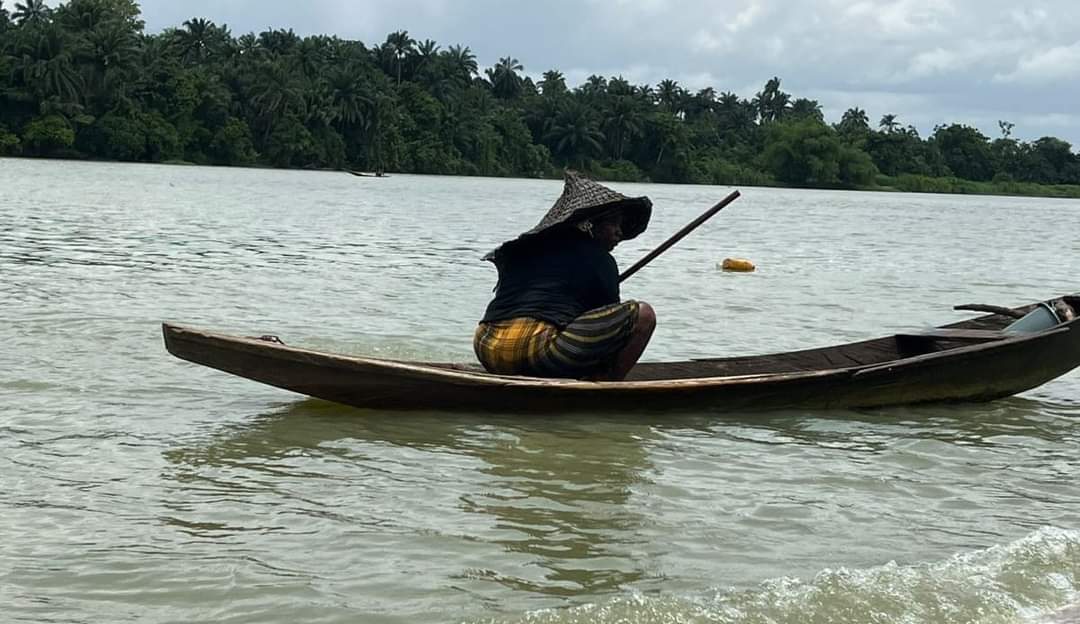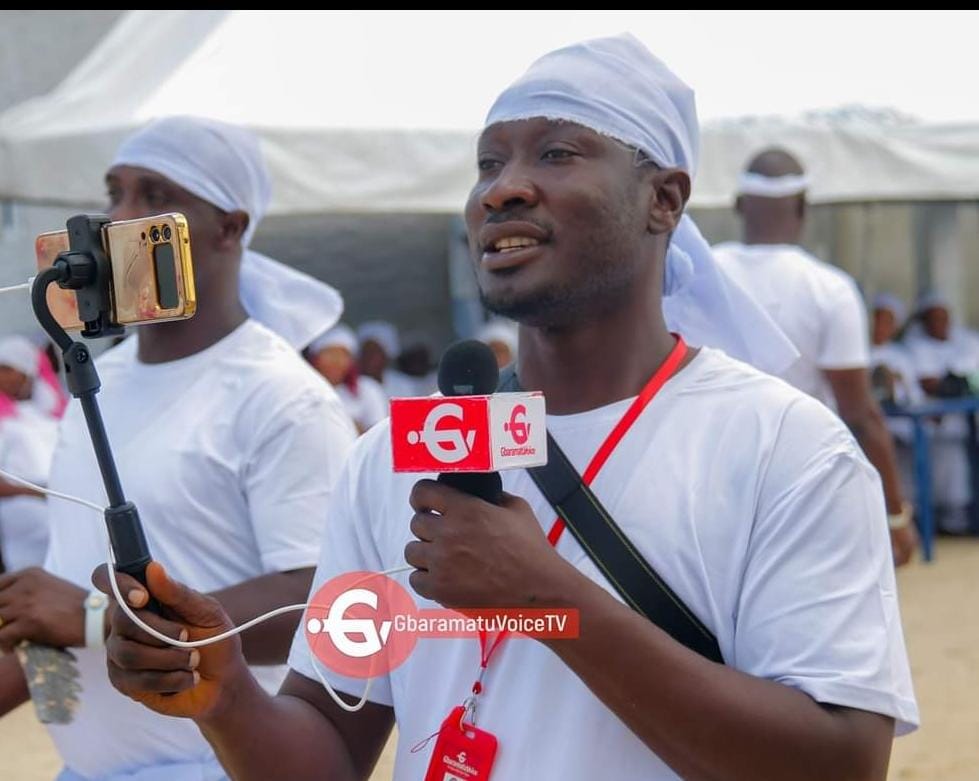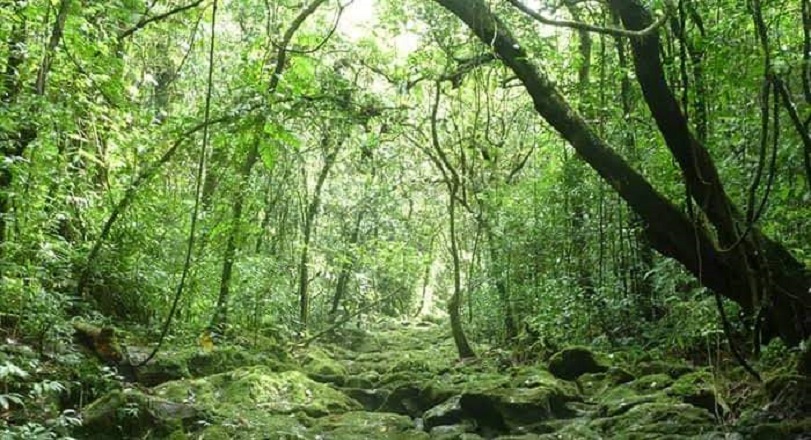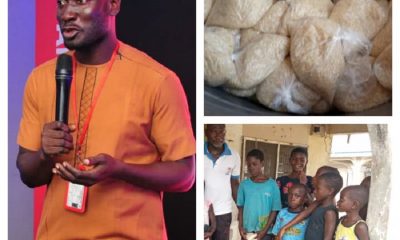Feature/OPED
The Weeping Women of Odimodi Community

By Asiayei Enaibo
The earth will completely lack its existence without women. The complementing value to the totality of women is the true essence of God’s complete creation. He (God) knew the value and took the most precious soul out of man for the creation of a woman for continuation of the Earthly evolution. So, a woman is closer to God as the last of his finest achievements in creation. So when women weep in pain, the soul of God is angry with her plea and petitions.
A society governed by men creates obnoxious laws in the old tradition to deprive women without any explanatory values to the laws. Even though the most inquisitive woman will ask, there are no answers from the men to it. Yes, in antiquity, men dominantory leadership was characterised by greed, selfishness, and superiority claim over their women, communal men made laws, till date, some communities in Ijawland still practice this uncultured act in the pool of civilization where education has refined the minds of men and women in our society.
The Odimodi community is affronting the totality of the female gender. Odimodi community is far from the Crusade of gender sensitivity. Then, the women are about to adapt to the principles of JP Clark’s The Wive’s Revolt in the Odimodi community as the women can’t bear the pains of male chauvinism anymore.
As culture is dynamic in human existence, as humans progress and evolve within the space of time, changes take different shapes and dimensions. It is in this regard that the words of High Chief Government Oweizide Ekpemupolo become a pinnacle of hope and transformation within the cultural space of Ijaw spirituality where the High Chief said in his conversation, about what is regarded as Sei-agonoweri in Ijaw. Chief, in his inquisitive spiritual pathways, highlighted who created the moons, the sun, and the seasons. All these are created by God. God never created any month that is characterised by evil. All months are zodiacally significant to man.
So, under this cultural evolution, Dr. Tompolo discarded in Ijaw spirituality that there is no Sei-Agonowei within the context of time as evolution and cultural processes take different shapes and dimensions.
Father Igologolo, Aziza came to perfect the Ijaw’s Journey to the right things and make women sacred beings in Ijaw Spirituality—a religion of inclusiveness in Egbesu Deity as well as the feminine form of gods well known in Ijaw as Ibolomoboere, Ziba-Opuoru. This alone defines Dr. TOMPOLO as Jesus in another form.
Odimodi is a community in the Burutu Local Government Area of Delta State. Weeping Women share their challenges and deep pains within the cultural space of denial of their rights and hope for a reformation that could create new visions that will transcend beyond the agonies they face.
A voice that echoes runs to the creeks and waves to the crescendo that recreates another new hope for the younger generations, particularly for the women of Odimodi community, Iduwini Kingdom in Delta state. And to begin with that, JP Clark’s The Wive’s Revolt became handy to the green space of women’s voices within the Niger Delta region. It is in this regard that Asiayei Enaibo was called upon to echo the weeping voices of the women of the Odimodi community, and this is the story.
Odimodi, that oil-rich community in Burutu Local Government Area of Delta State where women have no voice, where their fishing canoes and nets are consumed by pollution, chained down and mouths tied against their existence–Which gods did this to the women?
They bear children without corresponding female benefits. When they make attempts to speak, the men crow against them with communal laws, a threat to be locked in their sacred Town Hall where they barred women from entering in issues that affect the well being of the community called the “Eluwe Ware, known as the house of their progenitor.
Odimodi is a land of many scholars and professors, but their women, sisters had no fair share of oil spillage benefits where the chronic disease birthed on their shoulders and children through polluted waters and on the gill of the fishes caught in their nets. Yes, they have to take their fate like JP Clark’s Wives Revolt to demonstrate a change for fair share and women inclusiveness in the governance of oil Companies’ compensation sharing formula.
According to Doris Ingo, in her voice, “I felt the pains of denigration, subjugation, oppression, and total denial in our fathers and mothers Land.”
The recent OIL company compensation sharing formula where men could have a share of 5 million naira, or 5 hundred thousand. women will be given five thousand naira only, and any contrary voice from them, the men rebuke them on their faces that they are women, and they don’t have a right to anything is nothing short of internal marginalization. Doris said, “These men refuse to learn from the Examples of Dr Tompolo in his sharing formula. In Tantita Security Services Nigeria Limited, men are 60 per cent, women 40 per cent, but Odimodi community men take all and intimidate us again. In Odimodi, women are disenfranchised to vote, and vie for elective positions generally is a big problem for us. Our women are being imprisoned in their land. If you go to our neighbouring communities, women are playing active community engagements as well as Chiefs and making progress in life.
“We, the women, can’t accept it anymore. I summoned this courage to talk to you to be our voice. Let the transformation of Nigeria’s leadership begin with our communities against bad leadership.”
Weep not. Oh, women of Odimodi. Yes, one wrapper tied their waist when oil companies refused to pay their company workers, their husbands. They make women protest for their benefits during oil servicing contracts. The men drive the women to their husbands’ places and ask the single girls to go and marry and say this money belongs to the men.
What sacrilege did Odimodi women, daughters commit before their forefathers to pass through a generational curse of deprivation?
I heard a cry from the creeks, a forest of women without hope that if they can’t speak through the Talking Drum, their hope is lost till eternity. Doris Ingo weeps in pain like a woman in labour, the pills of the cry echo through waves and storms: “It is time to protest against our fathers, husbands, brothers, and uncles to change their ways.
“This time, we are taking protests against our fathers, husbands, brothers, and uncles who refused to give a fair share of oil money that belonged to the land.”
“Who are women in this land?” The men asked.
Ingo replied: “We are the women who made this land fertile with children. Without women, there is no community and no nation. Nine months, men in their wombs disfigured their natural shapes, but when they come out from our wombs, they create obnoxious laws and deprive us of the right to social and communal benefits. When men lived to their end times, they buried them in the town, but when our mothers died they took them to a forest far from home, yes you can’t even do your mother’s remembrance in Odimodi. It is a taboo in this modern generation. If it is a tradition, this tradition is long overdue to be reviewed. With all the education of our men, no one has said anything to transform this broken idea like JP Clark’s poem of “Ibadan”
If Professor Enaijite E. Ojaruega heard this, the feminist would ask all the women to take the Nigerian Protest against bad governance from their community and will take advocacy tips for total reformative measures. It has to start from Odimodi.
This untold story of women’s discrimination and denigration in the Niger Delta region is what late Prof. JP Clark artistically addressed in his Play, The Wive’s Revolt and I dramatically see this play enacted in a reality show if the men in Odimodi refuse to have a fair share of the oil money coming to the town and strategically position women in the affairs of the community Executive, a time will come the daughters will stage a movement against their fathers, uncles and brothers.
And if it is a curse, the women are willing to embark on a spiritual journey to the Grand Master of Ijaw Spirituality in Oporoza, High Chief Government Oweizide Ekpemupolo to revise it with offerings so they too can benefit and have a place in the oil-rich community.
Wailing women, their voices must be heard as Eniye Ingo expressed the grief of internal marginalization within the community.
“Another major issue is the fact that women in that community don’t vote. Where decisions are made, women are not involved in meetings or forums, even on issues that affect them directly. Women are not represented in the government or in any normal town meetings that occur regularly in open town halls. When meetings are called, the town crier makes it clear that only men are invited. The decisions taken in these meetings affect both women and men, yet women have no voice. In a world that has developed to the extent we are today, it is unacceptable that women do not have a voice in their community.”
That is one issue—they are not represented in any way and they don’t have a voice.
Secondly, they don’t vote. In Chairmanship elections, women are disenfranchised. Despite the significant population of women in the community, they are rendered voiceless. Their internal voices are muted. This time, we have emerged from the depths to speak.
Another issue is that, because they don’t vote, they don’t hold elective positions. If you look at the cabinet of the Odimodi community, there are no women—not as secretary, financial secretary, PR, or any position. If this continues, there will never be a female political figure from Odimodi, regardless of their education level. Even with a PhD, they cannot hold an elective position in the community. They don’t vote, just as it was in the pre-colonial and colonial era. This has not changed.
Yet, if Odimodi is listed among civilized communities, it will claim to be one. However, in this world where development, civilization, and globalization have occurred, and women are making impacts everywhere, Odimodi still covers its women with tarpaulin. They go to school, become classmates and colleagues with women making waves, celebrate figures like Dora Akunyili and Ngozi Okonjo-Iweala, but stifle their own sisters. These sisters are not entitled to the community’s common wealth.
The men have so stifled their sisters and daughters that they are not given a platform to make an impact in this competitive world. In neighboring communities and ethnic groups, there is stiff competition, yet Odimodi covers its own. How far can they go in a world where numbers are power when a significant part of their population is relegated?
The sad, untold story of Odimodi Community women is a tale of pre-colonialism in the modern era, where women’s authorship in English Literature was often under male names.
Yet, nobody says anything due to the culture of silence. This evil has been normalized to the extent that women who marry into the community from outside are more relevant than the Odimodi daughters. This shows how insignificant Odimodi women are made to feel in all areas, including the common wealth, which is finally bringing this issue to a head. This final straw is about the distribution of common wealth money. These issues have been happening for too long, and there will come a time when enough is truly enough.
The pain endured over time, anguish, and deprivation have made us women speak through the media. We will bear any threatening sword that faces us. Eniye Ingo opens the book of women’s lamentations, hoping for a change for the born and unborn girl child in the Odimodi community.
If any man doubts what I have said, let them tell us the history and unravel the mystery for us to benefit as women.
It is appalling to my readers of this chronicles of the weeping Women of Odimodi to read the story from the lips of Doris Ingo, a great daughter of the land who is hopeful that the media will help to put an end to such entrenched selfishness in the sharing of golden opportunities meant for the women however hard their gender is denigrated by the fathers, brothers and uncles to take a step for changes before international communities and women advocacy groups join their voices.
Asiayei Enaibo, a cultural journalist, writes from GbaramatuVoice
Feature/OPED
History is Watching: Tinubu’s Moment to Rescue Nigeria’s Stolen Future

By Blaise Udunze
Governance is not complicated. It is about people and the resources entrusted to serve them. When resources are managed wisely, the people prosper, and prosperity spreads. Mismanage them, and poverty multiplies. Nigeria’s tragedy is not scarcity. It is stewardship.
For decades, Nigeria, described as Africa’s largest oil producer, has earned hundreds of billions of dollars, yet remains home to some of the world’s poorest citizens. That contradiction is not accidental. It is systemic. It reflects policy distortion, institutional weakness, and a culture of impunity that has too often treated public wealth as political spoils rather than a national trust.
The Abuja-based Independent Media and Policy Initiative (IMPI) recently captured this paradox bluntly by saying, Nigeria’s poverty crisis is not the result of inadequate resources, but of persistent failure to manage them prudently and sustainably. It described the crisis as a “self-inflicted economic malady.” That phrase should trouble every public official.
Between 1980 and 2015, Nigeria rode multiple oil booms. Instead of converting windfalls into diversified productivity, the country succumbed to what economists call the Dutch disease. Oil revenues surged. The naira appreciated. Imports became cheaper. Domestic production became uncompetitive. Agriculture declined. Manufacturing withered.
IMPI’s analysis shows that between 1980 and 1986, exchange rate appreciation crippled local industries and turned Nigeria from a major agricultural exporter into a net food importer. Cocoa, palm oil, and rubber, once pillars of export strength, gave way to dependency. A parallel distortion emerged, the so-called “Nigerian disease.” Rural labour migrated to cities in search of oil-fueled wage spikes. Farming declined. Food insecurity deepened, which has continued to linger each day. Over-mechanised and poorly coordinated agricultural investments, uncompleted irrigation projects, and subsidies skewed toward politically connected elites widened inequality. Oil wealth created the wrong impression of prosperity while hollowing out the economy’s productive core.
Former Vice President Yemi Osinbajo once framed the issue plainly: Nigeria’s challenge is not geographical restructuring but resource management and service delivery. After decades of vast oil earnings, the uncomfortable question remains. Where is the infrastructure?
If mismanagement were purely historical, recovery might simply require time and discipline. But the problem is not confined to the past, and this is because between 2010 and 2026, an estimated $214 billion, roughly N300 trillion, has been flagged as missing, diverted, unrecovered, irregularly spent, or trapped in non-transparent fiscal structures. These figures reveal that they are not speculative but arise from audit reports, legislative investigations, civil society litigation, and investigative findings across administrations.
The oil sector alone provides sobering examples. In 2014, unremitted oil revenues triggered national outrage. Years later, audit queries continue to trail the Nigerian National Petroleum Company Limited. The names of institutions change. The pattern persists. The Central Bank of Nigeria has also faced audit alarms over trillions in unremitted surpluses and questionable intervention facilities. Auditor-General has flagged failures to remit operating surpluses into the Consolidated Revenue Fund, alongside hundreds of billions allegedly disbursed to unidentified beneficiaries under intervention schemes, which is alarming and a common fraudulent practice.
Across ministries, departments, and agencies, trillions have been cited in unsupported expenditures, unremitted taxes, procurement irregularities, and statutory liabilities left unrecovered. The institutions differ. The language of audit reports varies. The years change. The pattern does not.
A natural occurrence, which is the plain truth, and unarguably, is that when electricity funds disappear, the grid collapses. Also, when agricultural loans remain unrecovered, food prices surge. The same goes when social investment programmes stall due to bureaucratic lack of transparency; the vulnerable remain exposed. Nigeria borrows not only because revenue is insufficient but because leakage is persistent.
The 2026 fiscal projections sharpen the dilemma. This has continued to raise concern as seen in the proposed N58.47 trillion budget, which carries a N25.91 trillion deficit, with N15.9 trillion allocated to debt servicing. What signifies a systemic failure is that nearly half of the projected federal revenue will service past loans before development priorities are funded. The truth be told, borrowing is not inherently destructive. Economies such as the United States deploy deficit financing strategically to expand productivity. The difference lies in what the borrowing finances.
To date, Nigeria’s deficits are increasingly funded by recurrent obligations rather than productivity-enhancing infrastructure. This is why Nigeria’s domestic borrowing persistently crowds out private-sector credit, driving up interest rates and stifling enterprise. Time after time, the nation has continued to witness how weak revenue mobilisation, overt oil dependence, and institutional inefficiencies compound the strain, and for these reasons, public debt is projected to has surpass N177.14 trillion by the end of 2026, which is driven by the budget deficit in 2026 Appropriation Bill.
Based on what is obtainable in other advance country, debt becomes sustainable only when borrowed funds are channeled into growth-enhancing investments, institutions ensure transparency and value for money, and economic expansion outpaces debt accumulation. When these conditions weaken, deficits evolve into a fiscal trap.
Despite some of the challenges occasioned by mismanaged resources and leakages, policymakers project cautious optimism. The Central Bank forecasts GDP growth of approximately 4.49 percent, moderating inflation, and foreign reserves exceeding $50 billion. On paper, stability appears to be returning. But stability is not prosperity.
Take, for instance, between 2006 and 2014, Nigeria recorded average GDP growth rates of six to seven percent, peaking near eight percent. Yet poverty remained stubbornly high, judging by the lived experience of the populace. This shows that growth without inclusion is only an arithmetic, not development. Today, households confront elevated food prices despite the report that food inflation fell from 29.63 per cent in January 2025 to 8.89 per cent in January 2026, energy costs, and unemployment. Yes, one may say that the exchange-rate unification and fuel subsidy removal were economically rational reforms. However, without aggressive domestic production expansion and credible social safety nets, adjustment costs fall heavily on citizens.
The concept of the “resource curse,” coined by Professor Richard Auty, explains why resource-rich nations often experience weaker institutions and lower long-term growth than resource-poor peers. Nigeria truly exemplifies that irony. Yet the curse is not inevitable. This is because countries such as Norway and Botswana transformed natural resource wealth into long-term prosperity through disciplined institutions, sovereign wealth management, and uncompromising transparency, which happens to be foreign to Nigeria’s system. The difference was not geology. It was governance.
Former President Olusegun Obasanjo has never been quite over resource plundering as he lamented that Nigeria has squandered divine gifts. The same lies with the former Minister George Akume, who warned that no nation grows if a quarter of its resources are consistently mismanaged. The former Anambra governor, Peter Obi, observed bluntly that wealth cannot be entrusted to those without integrity. The United Nations is also amongst those who have repeatedly warned that mismanaged natural resources fuel instability and conflict. Where institutions are weak, resource wealth becomes combustible. Nigeria has navigated that edge for decades.
Nigeria does not suffer from a shortage of reform announcements. It suffers from a gap between announcement and enforcement. The Treasury Single Account was designed to consolidate public funds under constitutional oversight. Yet significant funds have periodically remained outside complete transparency. The problem is that audit findings often accumulate without visible recovery, prosecution, or systemic reform.
The reality is that if every naira saved from subsidy reform is not transparently reinvested in infrastructure, healthcare, education, and productivity, public trust will erode further. If intervention facilities are not tracked and repaid, agriculture will stagnate. If oil revenues are not fully remitted and independently audited, diversification will remain rhetorical, just as they have defined the system today. What will definitely propel a change when visible enforcement, recoveries, prosecutions, and institutional strengthening must replace quiet reports and circular memos.
President Bola Ahmed Tinubu stands at a consequential intersection due to the critical issues unfolding. His administration has initiated painful but necessary reforms in the areas of fuel subsidy removal, exchange-rate unification, and fiscal restructuring. One stands to say that these measures aim to restore macroeconomic order. But for a fact, macroeconomic stability is a foundation, not a destination. His presidency will either mark the beginning of Nigeria’s fiscal rescue or consolidate a system that mortgages tomorrow to survive today.
Human capital cannot remain peripheral. Education aligned with labour-market needs, vocational capacity, healthcare access, and social protection are economic multiplier, not welfare indulgences. Capital expenditure must prioritise integrated infrastructure like power transmission, logistics corridors, and digital connectivity, that unlocks productivity. Every earned naira must enter the Federation Account transparently. Every statutory surplus must be constitutionally remitted. Every diversion must carry a consequence.
One thing that must be understood today is that Nigeria’s future will not be determined solely by oil output or GDP growth percentages. It will be determined by whether resources translate into reliable electricity, functioning roads, expanding industries, competitive exports, and rising household incomes. A nation can borrow to build bridges. Or it can borrow to pay salaries. The former compounds growth. The latter compounds debt.
If deficits translate into visible infrastructure, industrial expansion, thriving private enterprise, and strengthened revenue generation, history will record this era as a bold recalibration. If not, it will be remembered as deferred reckoning.
Nigeria has been wealthy for decades. What it has lacked is disciplined guardianship of that wealth. End the era of systemic leakage and institutional silence, or preside over its continuation. The choice is stark but clear. The point is, this is not just about one leader’s legacy; it is about the future of over 200 million Nigerians and generations.
And for nearly 200 million Nigerians, the outcome will define not just a presidency, but a generation.
Blaise, a journalist and PR professional, writes from Lagos and can be reached via: bl***********@***il.com
Feature/OPED
How Christians Can Stay Connected to Their Faith During This Lenten Period

It’s that time of year again, when Christians come together in fasting and prayer. Whether observing the traditional Lent or entering a focused period of reflection, it’s a chance to connect more deeply with God, and for many, this season even sets the tone for the year ahead.
Of course, staying focused isn’t always easy. Life has a way of throwing distractions your way, a nosy neighbour, a bus driver who refuses to give you your change, or that colleague testing your patience. Keeping your peace takes intention, and turning off the noise and staying on course requires an act of devotion.
Fasting is meant to create a quiet space in your life, but if that space isn’t filled with something meaningful, old habits can creep back in. Sustaining that focus requires reinforcement beyond physical gatherings, and one way to do so is to tune in to faith-based programming to remain spiritually aligned throughout the period and beyond.
On GOtv, Christian channels such as Dove TV channel 113, Faith TV and Trace Gospel provide sermons, worship experiences and teachings that echo what is being practised in churches across the country.
From intentional conversations on Faith TV on GOtv channel 110 to true worship on Trace Gospel on channel 47, these channels provide nurturing content rooted in biblical teaching, worship, and life application. Viewers are met with inspiring sermons, reflections on scripture, and worship sessions that help form a rhythm of devotion. During fasting periods, this kind of consistent spiritual input becomes a source of encouragement, helping believers stay anchored in prayer and mindful of God’s presence throughout their daily routines.
To catch all these channels and more, simply subscribe, upgrade, or reconnect by downloading the MyGOtv App or dialling *288#. You can also stream anytime with the GOtv Stream App.
Plus, with the We Got You offer, available until 28th February 2026, subscribers automatically upgrade to the next package at no extra cost, giving you access to more channels this season.
Feature/OPED
Turning Stolen Hardware into a Data Dead-End

By Apu Pavithran
In Johannesburg, the “city of gold,” the most valuable resource being mined isn’t underground; it’s in the pockets of your employees.
With an average of 189 cellphones reported stolen daily in South Africa, Gauteng province has become the hub of a growing enterprise risk landscape.
For IT leaders across the continent, a “lost phone” is rarely a matter of a misplaced device. It is frequently the result of a coordinated “snatch and grab,” where the hardware is incidental, and corporate data is the true objective.
Industry reports show that 68% of company-owned device breaches stem from lost or stolen hardware. In this context, treating mobile security as a “nice-to-have” insurance policy is no longer an option. It must function as an operational control designed for inevitability.
In the City of Gold, Data Is the Real Prize
When a fintech agent’s device vanishes, the $300 handset cost is a rounding error. The real exposure lies in what that device represents: authorised access to enterprise systems, financial tools, customer data, and internal networks.
Attackers typically pursue one of two outcomes: a quick wipe for resale on the secondary market or, far more dangerously, a deep dive into corporate apps to extract liquid assets or sellable data.
Clearly, many organisations operate under the dangerous assumption that default manufacturer security is sufficient. In reality, a PIN or fingerprint is a flimsy barrier if a device is misconfigured or snatched while unlocked. Once an attacker gets in, they aren’t just holding a phone; they are holding the keys to copy data, reset passwords, or even access admin tools.
The risk intensifies when identity-verification systems are tied directly to the compromised device. Multi-Factor Authentication (MFA), widely regarded as a gold standard, can become a vulnerability if the authentication factor and the primary access point reside on the same compromised device. In such cases, the attacker may not just have a phone; they now have a valid digital identity.
The exposure does not end at authentication. It expands with the structure of the modern workforce.
65% of African SMEs and startups now operate distributed teams. The Bring Your Own Device (BYOD) culture has left many IT departments blind to the health of their fleet, as personal devices may be outdated or jailbroken without any easy way to know.
Device theft is not new in Africa. High-profile incidents, including stolen government hardware, reinforce a simple truth: physical loss is inevitable. The real measure of resilience is whether that loss has any residual value. You may not stop the theft. But you can eliminate the reward.
Theft Is Inevitable, Exposure is Not
If theft cannot always be prevented, systems must be designed so that stolen devices yield nothing of consequence. This shift requires structured, automated controls designed to contain risk the moment loss occurs.
Develop an Incident Response Plan (IRP)
The moment a device is reported missing, predefined actions should trigger automatically: access revocation, session termination, credential reset and remote lock or wipe.
However, such technical playbooks are only as fast as the people who trigger them. Employees must be trained as the first line of defence —not just in the use of strong PINs and biometrics, but in the critical culture of immediate reporting. In high-risk environments, containment windows are measured in minutes, not hours.
Audit and Monitor the Fleet Regularly
Control begins with visibility. Without a continuous, comprehensive audit, IT teams are left responding to incidents after damage has occurred.
Opting for tools like Endpoint Detection and Response (EDR) allows IT teams to spot subtle, suspicious activities or unusual access attempts that signal a compromised device.
Review Device Security Policies
Security controls must be enforced at the management layer, not left to user discretion. Encryption, patch updates and screen-lock policies should be mandatory across corporate devices.
In BYOD environments, ownership-aware policies are essential. Corporate data must remain governed by enterprise controls regardless of device ownership.
Decouple Identity from the Device
Legacy SMS-based authentication models introduce avoidable risk when the authentication channel resides on the compromised handset. Stronger identity models, including hardware tokens, reduce this dependency.
At the same time, native anti-theft features introduced by Apple and Google, such as behavioural theft detection and enforced security delays, add valuable defensive layers. These controls should be embedded into enterprise baselines rather than treated as optional enhancements.
When Stolen Hardware Becomes Worthless
With POPIA penalties now reaching up to R10 million or a decade of imprisonment for serious data loss offences, the Information Regulator has made one thing clear: liability is strict, and the financial fallout is absolute. Yet, a PwC survey reveals a staggering gap: only 28% of South African organisations are prioritising proactive security over reactive firefighting.
At the same time, the continent is battling a massive cybersecurity skills shortage. Enterprises simply do not have the boots on the ground to manually patch every vulnerability or chase every “lost” terminal. In this climate, the only viable path is to automate the defence of your data.
Modern mobile device management (MDM) platforms provide this automation layer.
In field operations, “where” is the first indicator of “what.” If a tablet assigned to a Cape Town district suddenly pings on a highway heading out of the city, you don’t need a notification an hour later—you need an immediate response. An effective MDM system offers geofencing capabilities, automatically triggering a remote lock when devices breach predefined zones.
On Supervised iOS and Android Enterprise devices, enforced Factory Reset Protection (FRP) ensures that even after a forced wipe, the device cannot be reactivated without organisational credentials, eliminating resale value.
For BYOD environments, we cannot ignore the fear that corporate oversight equates to a digital invasion of personal lives. However, containerization through managed Work Profiles creates a secure boundary between corporate and personal data. This enables selective wipe capabilities, removing enterprise assets without intruding on personal privacy.
When integrated with identity providers, device posture and user identity can be evaluated together through multi-condition compliance rules. Access can then be granted, restricted, or revoked based on real-time risk signals.
Platforms built around unified endpoint management and identity integration enable this model of control. At Hexnode, this convergence of device governance and identity enforcement forms the foundation of a proactive security mandate. It transforms mobile fleets from distributed risk points into centrally controlled assets.
In high-risk environments, security cannot be passive. The goal is not recovery. It is irrelevant, ensuring that once a device leaves authorised hands, it holds no data, no identity leverage, and no operational value.
Apu Pavithran is the CEO and founder of Hexnode
-

 Feature/OPED6 years ago
Feature/OPED6 years agoDavos was Different this year
-
Travel/Tourism10 years ago
Lagos Seals Western Lodge Hotel In Ikorodu
-

 Showbiz3 years ago
Showbiz3 years agoEstranged Lover Releases Videos of Empress Njamah Bathing
-

 Banking8 years ago
Banking8 years agoSort Codes of GTBank Branches in Nigeria
-

 Economy3 years ago
Economy3 years agoSubsidy Removal: CNG at N130 Per Litre Cheaper Than Petrol—IPMAN
-

 Banking3 years ago
Banking3 years agoSort Codes of UBA Branches in Nigeria
-

 Banking3 years ago
Banking3 years agoFirst Bank Announces Planned Downtime
-

 Sports3 years ago
Sports3 years agoHighest Paid Nigerian Footballer – How Much Do Nigerian Footballers Earn





















